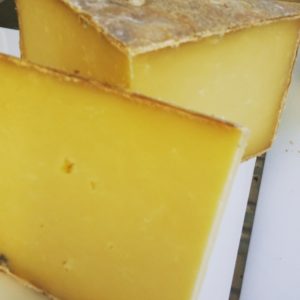
An organic, mature, rind-washed cheddar from the Pextenement Cheese Company, based in Todmorden. It won a silver award at the Artisan cheese awards.

An organic, mature, rind-washed cheddar from the Pextenement Cheese Company, based in Todmorden. It won a silver award at the Artisan cheese awards.
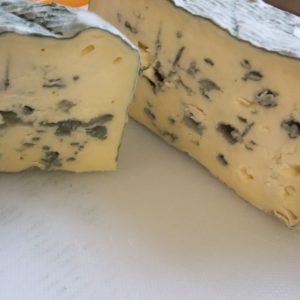
An organic, soft blue cheese from the Pextenement Cheese Company, based in Todmorden. It won a gold award at the Artisan cheese awards, and finished 2nd in
the organic class.
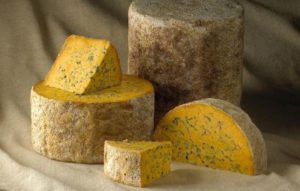
Until recently, Shropshire Blue had never been made in Shropshire. Who knew? Time for a history lesson.
In his 1995 book “The Great Cheeses of Great Britain and Ireland”, Robert Smith writes:
Shropshire Blue is a misnomer as the cheese was first produced in Scotland. Penicillium roqueforte produces the blue veins, and annatto gives a golden-orange colour. Ripened for 10–12 week, when it is said that the cheese has ‘a bit more bite than Stilton’. Makers include Colston Bassett, Cropwell Bishop, Long Clawson, Millway and Tuxford and Tebbutt.
This list of makers is also a list of the Midlands Stilton-producing powerhouses, and today includes Hartington, who make our Shropshire.
In 1982, Patrick Rance wrote a more detailed history of the early years of Shropshire Blue in “The Great British Cheese Book”, in his own distinctive style:
One of the blue cheeses made for some years at Castle Stuart Dairy, Inverness, was sponsored by Adamsons of Short Street, London, who sold it as Shropshire Blue. Andy Williamson, much respected in the Stilton world, went back to Scotland to make the new cheese, a lightly pressed blue with a deep red curd, which found a ready sale throughout the country in good cheese shops. Then orders were refused in spring 1980, with a promise of ‘more later’. For unexplained and unfathomable reasons the North of Scotland Milk Marketing Board had closed the dairy and the ‘more later’ came from Hankelow. Elliot Hulme and his Blue Cheshire cheesemaker Harry Hanlin showed their first public Shropshire Blue at the Nantwich Show in July 1980. They had been helped with advice from Charlie Chisholm, who managed the Castle Stuart Dairy when the cheese was made there.
All the milk for the cheese was unpsteurised, and came from Hankelow pastures. Mr Hulme had to quote EEC regulations against monopolistic restraint of trade to persuade the Milk Marketing Board to let him buy his extra milk for his enterprise from his co-operator.
Mr Hulme told me in September 1980 that first Shropshire Blues from Hankelow has proved a little firmer and deeper red than the cheeses made in Inverness. He has since ceased production, but in 1981 John Adamson and Company got Long Clawson Stilton Dairy interested in this cheese, coming back to the nineteenth-century conception of Stilton Cheshire.
Not much has changed with this tasty, orange coloured, blue cheese since then. Pasteurised milk is now used, as
is using animal rennet, so the cheese is not suitable for veggieburgers.
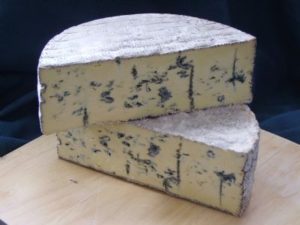
We’ve spent 2018 exploring some exciting new cheesemakers: Leicestershire Handmade, Sheffield Cheesemasters and Olianas. This week, we return much closer to home, with Dovevale Blue from Hartington Cheese. It’s a soft, creamy cheese with a mild blue flavour. The cheese is brine dipped, instead of being dry-salted, and … hang on, haven’t we heard this all before?
Well.
Protected Designation of Origin (P.D.O.) is a European initiative, offering protection to foodstuffs made in specific locations, by not allowing cheap knock-offs to be produced elsewhere. There’s a question as to what will happen when we leave the EU, with American manufacturers hoping to sell “Cornish” pasties (currently protected by P.D.O.) in the U.K. But that’s for another time.
There are eighteen cheeses with P.D.O. protection in the U.K., one of which is Dovedale. DoveDale. Made by the Staffordshire Cheese Co. Ah, so Hartington’s DoveVale must be one of those cheap knock-offs? In fact, Hartington Creamery was making Dovedale back in 2007, when the P.D.O. was registered. The creamery closed in 2009, and by the time cheesemaking resumed in Hartington in 2014, it was being made down the road. But there’s nothing to stop Hartington calling their new cheese Dovedale too; after all, there are seven makers of Blue Stilton, which is also a protected name.
So I wonder why Dovevale isn’t Dovedale? Answers on a postcard. Postmarked “Brussels”.
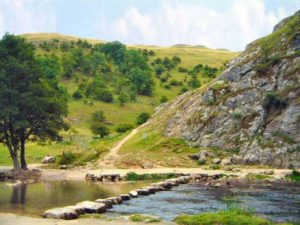

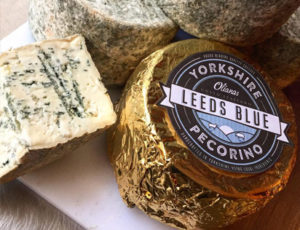
Like most of the post in Chinley, last week’s Cheese of the Week was lost in the snow. A brief recap: Leeds Blue is another offering from Olianas. It’s a smooth, rich, creamy blue.
I do like a bit of Gorgonzola.
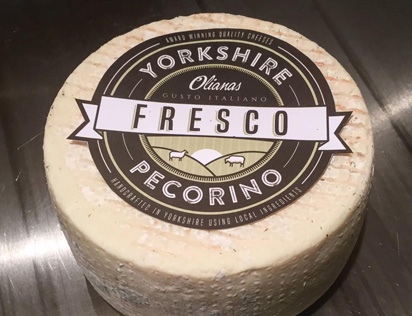
Pecorino is Italian sheep’s cheese: “pecora” means “sheep” in Italian. When I think of pecorino, I think of a hard, aged, nutty cheese, much like our Berkswell Ewe. That’s because stagionato (seasoned = aged) cheeses travel well, and are the varieties normally exported. But within Italy fresco (fresh = young) are also made, but rarely exported.
Mario Olianas is from Sardinia, but now lives in Leeds. He makes a classic Pecorino Fresco using milk from Harrogate and cultures from Italy. It’s only 30 days old, and is smooth, yogurty and sweet. Come enjoy our finest Italian Leodensian cheese.
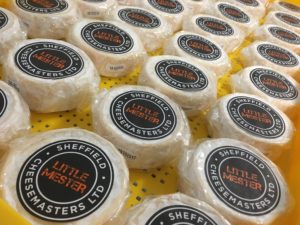
Sophie Williamson from Sheffield Cheesemasters is the only cheese manufacturer in Sheffield. Sophie decided to become a cheesemaker a year ago, after attending some professional cheesemaking courses at the School of Artisan Food. She experimented at home making lots of different types of cheese, before converting an industrial unit in the city to a make room and maturing rooms. They currently make around 250 cheeses per week using 300 litres of pasteurised milk, sourced from the local farm Our Cow Molly.
Little Mester is Sophie’s first cheese, released at the end of 2017. It as a surface-ripened soft cheese, matured for only two and a half weeks, so fresh and young tasting. It’s soft and gooey on the outside with a firmer core which continues to ripen if left for longer.
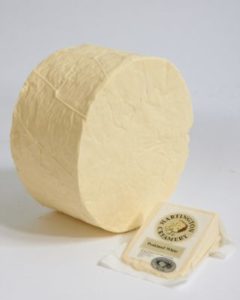
Peakland White is a crumbly, salty cheese made by our friends in Hartington. They describe it as having similarities to Cheshire, White Stilton, and Feta, and it lends itself to being flavoured with cranberries or smoked tomatoes. It is matured for only two weeks, and thus tastes young, fresh and clean. Suitable for vegetarians, and made with pasteurised local Derbyshire milk.